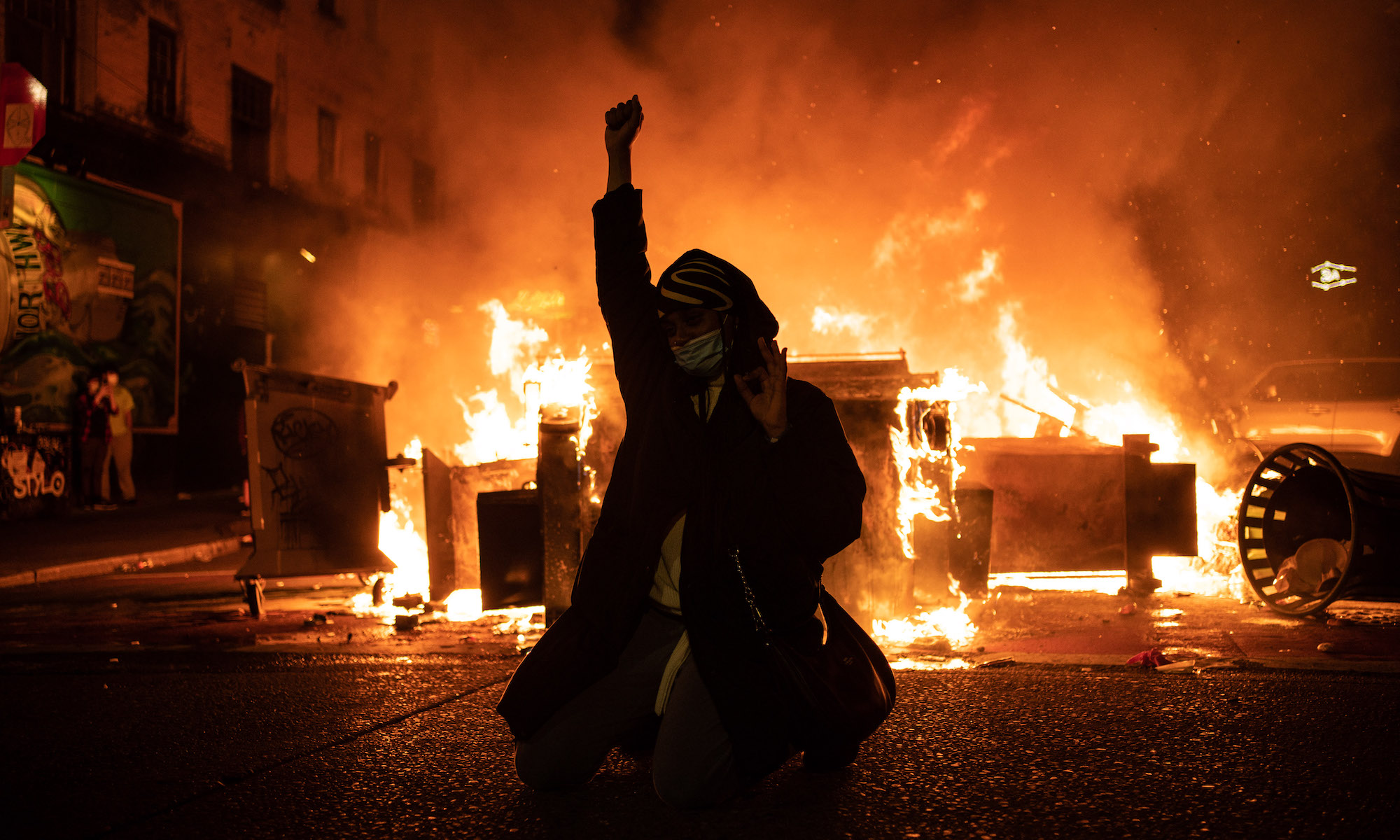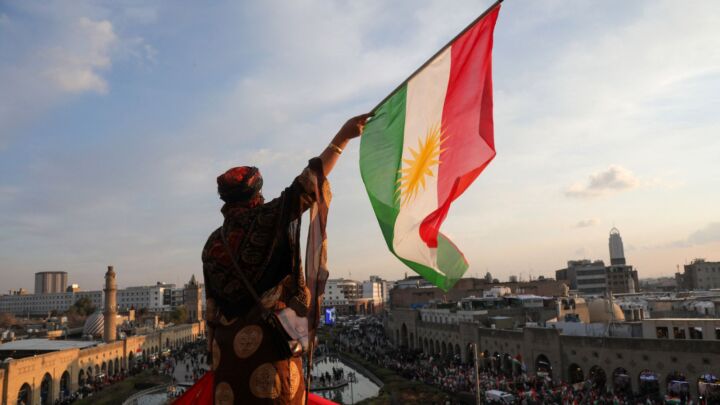Black Lives Matter was an outbreak of global hysteria
Five years on, you would be hard-pressed to name a single benefit of the so-called racial reckoning.

Want unlimited, ad-free access? Become a spiked supporter.
I ordinarily ignore the historical anniversary, so often a peg for lazy journalistic filler. But the events of five years ago have been so consequential that a spot of reflection is in order.
I refer not to the death of George Floyd, a petty criminal in a petty place who no more deserved to be beatified than he deserved to die. Perhaps best emblemised by the communal mourning of ‘Blackout Tuesday’, the excessive international reaction to his death is what merits a revisit. Via social media, on 2 June 2020, eight days after Floyd’s demise, black people were advised to refuse to work. Staff in the music industry also downed tools. Sony vowed to increase grief counselling and group meditation for its employees. Spotify added memorial silences to podcasts and playlists (whose logos were darkened, which must have made so much difference to the black lives that mattered so much) lasting eight minutes and 46 seconds, the time our hero spent with a policeman’s knee on his neck. Cable channels likewise went off the air for 8”46’ . Personally, I hope the latter style of political exhibitionism continues to flourish. I love the idea of pietistic protest taking the form of shutting the fuck up.
That Tuesday, solid black squares went up all over Facebook and Instagram – a costless, conformist and perfectly pointless pantomime, if also coercive; anyone who resisted posting a digital tattoo that advertised ‘I do whatever I’m told and I have no mind of my own’ risked his or her career. Yet this fad for abstract expressionism paled in comparison with the larger self-righteous free-for-all, especially in the United States: the looting, arson, vandalism and violence that went on for months. So, what did we garner for all that mayhem?
Nothing good. I’m hard-pressed to summon a single benefit of this hysteria. Even the racial reckoning that white Americans were supposedly engaged in for the first time (total bollocks; Americans have been having a racial reckoning for my entire life) was fake – posturing, gestural and insincere. At least the agricultural sector must have prospered. Crops thrive on manure, and I can’t remember a time when we were surrounded by more horseshit.
The fact that those opportunistic rioters were almost never brought to book has helped cultivate a burgeoning black subculture of entitled tearaways stuck in the developmental stage of toddlerhood. In videos now all over the internet, haughty young black Americans stage public tantrums in fast-food outlets, convenience stores, pharmacies and Walmarts. The standard protocol entails pushing down displays, clearing shelves, smashing products, flinging food, screaming obscenities and menacing staff. Groups of these perma-children hit retail outlets and bundle away whole racks of clothing they haven’t paid for.
All that shit-eating, knee-taking excuse-me-for-living from white folks for five solid years has created these monsters. Because the spirit of these marauders is sanctimonious. They take whatever they want, because they’ve been told repeatedly that they are owed. Exemplifying the self-abasing hair-shirtery that the BLM movement fostered, a taskforce convened to study slave reparations (250 years after the fact) in San Francisco – in the state of California, which never even had slavery – recommended in 2023 that taxpayers award every black person in the state $5million cash. Do you imagine dangling that kind of money as a reward for a sense of personal grievance has an improving effect on character?
BLM hysteria has put race relations in the toilet. It has encouraged hyper-sensitivity in the so-called marginalised – who rather than cower at the very edges of the cultural A4 have since 2020 monopolised the very centre of the page. It has made white people paranoid, skin-crawlingly deferential and desperate to avoid any mention of race, even to each other. It has increased the appetite for racial segregation and discouraged the formation of cross-racial friendships. Blacks have been urged to see whites as evil and congenitally bigoted. With all the new rules, which are constantly changing, whites worry that if they say so much as, ‘How do you do?’, black people will take their heads off. Both races feel better off just avoiding each other.
The explosion of ‘diversity, equity and inclusion’ has put loads of unqualified black people, especially double-token black women, in positions they haven’t earned. When they prove to be incompetent, that isn’t really their fault. The poster child for this phenomenon is Claudine Gay, the plagiarising president of Harvard forced to resign in disgrace. The real disgrace was that America’s foremost university ever hired an academic with such a flimsy CV for that prestigious post in the first place.
Meanwhile, the drive for ‘diversity’ in the media has led to a staggering over-representation of black people (14 per cent of the American population, under four per cent of the UK’s), about which it’s been impossible to complain. How telling that when I type ‘percentage of black people in UK’ into Google, one of the first autofill options is ‘percentage of black people in UK adverts’. Ever since the Floydian watershed, new television series have been disproportionately chocka with black characters. Did parliament pass a law? Because overnight, every police detective on TV had to be a black woman. Every sympathetic white character is in a biracial marriage. All one-way, ‘colourblind casting’ is anything but, so now English historical dramas look as if they were filmed in Nigeria. Following the Covid closures, new Broadway plays were almost all by and about black people. Black models have dominated glossy magazines – preferably trans black models. Ever since mid-2020, the New York Times has ceaselessly promoted black writers, artists, architects, entrepreneurs, actors, directors, CEOs and designers, so conspicuously shunning the more lightly complected that you’d think they’d have long ago run out of even faintly notable black interviewees. The arts slot of PBS NewsHour could have been filmed in Nigeria, too – for five bloody years.
But all this bending over backwards backfires. Nowadays, spotting a profile of a black chef in the New York Times food section, subscribers are likely to note casually, ‘Oh, another pointed article about a black person who was chosen for being black’. Racial preferences paint even the talented with the same tainted brush.
Is this ever going to stop? Have we paid enough penance yet? When can we call time on all this pandering? Why do all of us have to atone for the death of one guy in Minneapolis?
Some black people are getting sick of black people. On YouTube, I discovered the term ‘black fatigue’. Some black podcasters willingly admit that the whining has gone too far and has lasted too long. They’ve especially had it up to the eyeballs with the marauders throwing rampaging hissy fits in public.
The whole international spaz attack was triggered by a misfortune that wasn’t even necessarily the result of racial prejudice, as otherwise proof of Derek Chauvin’s history of bigotry would have occupied centre stage during his trial. This sustained social mania is yet more evidence for the capacity of another kind of race, the human one, to go collectively insane. Those Britons who trooped out to join the thousands chanting, ‘Hands up! Don’t shoot!’, at an unarmed constabulary might now review their participation with a cooler head.
Maybe ask: why did I imagine that this one perceived injustice in someone else’s country had anything to do with me? What forces coalesced to get me out the door? Was I thinking for myself or simply being swept along – and if the latter, does that mean I can be manipulated into doing just about anything by the mere fact that everyone else is doing it? Isn’t that a little scary? What did I hope I’d achieve with all that marching and shouting? Did I achieve anything? Isn’t the honest answer no?
Few drugs are more addictive than righteous indignation. So, expecting that next time – and there will be a next time – everyone will get a grip and refuse to join the hive mind is psycho-chemically optimistic.
Lionel Shriver is a novelist and journalist. Her latest book, Mania, is published by the Borough Press.
£1 a month for 3 months
You’ve hit your monthly free article limit.
Support spiked and get unlimited access.
Support spiked – £1 a month for 3 months
spiked is funded by readers like you. Only 0.1% of regular readers currently support us. If just 1% did, we could grow our team and step up the fight for free speech and democracy.
Become a spiked supporter and enjoy unlimited, ad-free access, bonus content and exclusive events – while helping to keep independent journalism alive.
———————————————————————————————————————————–
Exclusive January offer: join today for £1 a month for 3 months. Then £5 a month, cancel anytime.
———————————————————————————————————————————–
Monthly support makes the biggest difference. Thank you.










Comments
Want to join the conversation?
Only spiked supporters and patrons, who donate regularly to us, can comment on our articles.